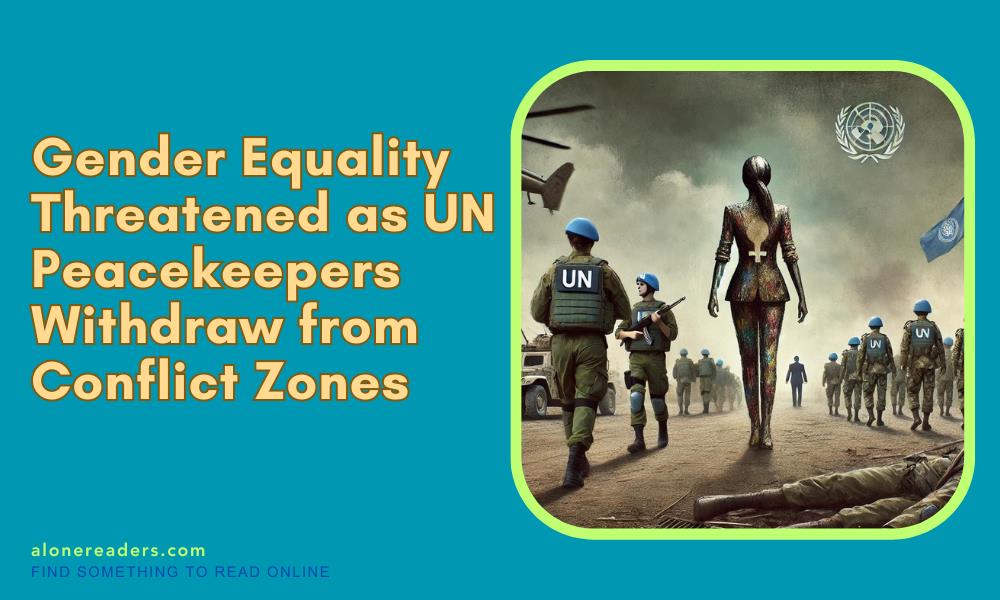
The withdrawal of United Nations (UN) peacekeeping forces from conflict zones poses a grave threat to gender equality and the protection of women and girls, according to UN officials. As international attention shifts and resources are redirected, the vacuum left by peacekeepers could result in escalating violence, discrimination, and a rollback of hard-won gains in women's rights. This article explores the potential consequences of peacekeeper withdrawals and highlights the urgent need for sustained international efforts to safeguard gender equality in conflict-affected regions.
UN peacekeeping missions have been instrumental in protecting civilians, including women and girls, in some of the world’s most volatile regions. These forces often serve as a buffer between warring factions, providing a semblance of stability that allows for the protection and empowerment of vulnerable populations. Over the years, peacekeepers have been at the forefront of efforts to address gender-based violence, promote women's participation in peace processes, and ensure that gender perspectives are integrated into the rebuilding of post-conflict societies.
The UN's commitment to gender equality is enshrined in its mandates, with specific measures designed to protect women and girls from sexual violence, exploitation, and abuse. These initiatives have included the deployment of gender advisors, the establishment of women's protection units, and the support of local women’s organizations. In many cases, peacekeepers have worked to create safe spaces for women and girls, facilitating access to education, healthcare, and legal services that are crucial for their empowerment.
The withdrawal of UN peacekeepers from conflict zones, often due to shifting political priorities or budgetary constraints, can have devastating consequences for women and girls. Without the presence of peacekeeping forces, there is a significant risk that the fragile security gains made in recent years could be undone, leading to a resurgence of violence and instability.
Increased Vulnerability to Gender-Based Violence: One of the most immediate and concerning consequences of peacekeeper withdrawal is the increased vulnerability of women and girls to gender-based violence. In many conflict zones, women are already disproportionately affected by violence, including sexual assault, domestic abuse, and human trafficking. The absence of peacekeepers, who often serve as the first line of defense against such violence, could leave women and girls more exposed to these threats.
Erosion of Women’s Rights and Participation: The withdrawal of peacekeepers could also undermine the progress made in ensuring women's participation in peacebuilding and governance. In several conflict-affected countries, the presence of UN forces has helped to create an environment in which women can participate in political processes and advocate for their rights. Without this support, there is a risk that women will be sidelined, and their voices will be silenced in critical decision-making processes.
Humanitarian Crisis and Lack of Essential Services: The departure of peacekeepers could exacerbate existing humanitarian crises, making it even more difficult for women and girls to access essential services such as healthcare, education, and legal assistance. In many conflict zones, these services are already stretched thin, and the withdrawal of international forces could push them to the brink of collapse.
Impact on Local and Regional Stability: The withdrawal of peacekeepers could lead to a power vacuum that various armed groups may exploit, further destabilizing the region. This instability disproportionately affects women and girls, who often bear the brunt of conflict-related displacement and economic hardship. The resulting chaos could reverse decades of progress in gender equality, as communities revert to traditional, patriarchal norms in the absence of strong international oversight.
UN officials and human rights advocates are calling for renewed international commitment to protecting gender equality in conflict zones, even as peacekeeping missions wind down. This support can take various forms, including diplomatic pressure on local governments to uphold women's rights, increased funding for humanitarian aid focused on women and girls, and the establishment of regional mechanisms to monitor and prevent gender-based violence.
Strengthening Local Institutions: One of the most effective ways to mitigate the impact of peacekeeper withdrawal is to strengthen local institutions and empower them to protect women and girls. This includes providing training and resources to local law enforcement, judiciary, and healthcare providers to ensure they can continue to uphold gender equality in the absence of international forces.
Building Capacity of Women’s Organizations: Supporting local women's organizations is crucial for sustaining gender equality gains. These organizations often have deep roots in their communities and are well-positioned to advocate for women's rights and provide essential services. International donors and agencies should prioritize funding and capacity-building initiatives that enable these groups to continue their work independently.
Promoting Regional Cooperation: Regional organizations and neighboring countries can play a vital role in maintaining stability and protecting gender equality in conflict-affected areas. By fostering regional cooperation and information-sharing, the international community can help prevent the spillover of conflict and ensure that women and girls are protected across borders.
Continued Monitoring and Advocacy: Even after the withdrawal of peacekeepers, it is essential that the international community continues to monitor the situation in conflict zones and advocate for the protection of women and girls. This can include supporting independent human rights organizations, deploying special rapporteurs, and using diplomatic channels to hold local authorities accountable for their obligations under international law.
Conclusion
The withdrawal of UN peacekeepers from conflict zones presents a significant challenge to the ongoing efforts to achieve gender equality and protect the rights of women and girls. While the departure of these forces may be inevitable in some cases, it is crucial that the international community remains vigilant and committed to supporting the most vulnerable populations. By strengthening local institutions, empowering women's organizations, and promoting regional cooperation, the global community can help ensure that the progress made in gender equality is not lost in the wake of peacekeeper withdrawal. The stakes are high, and the cost of inaction could be measured in the lives and futures of countless women and girls.